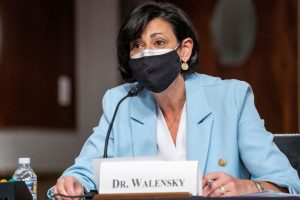CDC Stands By K-12 Masking Guidance as States Relax
 With COVID-19 cases still high nationwide, “now is not the moment” to drop mask mandates in schools and other public places, U.S. Centers for Disease Control and Prevention (CDC) Director Dr. Rochelle Walensky told Reuters on February 8.
With COVID-19 cases still high nationwide, “now is not the moment” to drop mask mandates in schools and other public places, U.S. Centers for Disease Control and Prevention (CDC) Director Dr. Rochelle Walensky told Reuters on February 8.
Her comments follow announcements by officials in New Jersey, Connecticut, Delaware, California and Oregon that they plan to lift indoor mask mandates for K-12 public schools and other indoor spaces in coming weeks, seeking a return to normalcy as infections spurred by the Omicron variant of the coronavirus ebb.
“I know people are interested in taking masks off. I too am interested. That would be one marker that we have much of the pandemic behind us,” Walenksy said in an interview.
“Right now our CDC guidance has not changed … We continue to endorse universal masking in schools.”
Walensky said the CDC has always acknowledged that state and local jurisdictions are responsible for masking policies, but the agency’s guidance remains unchanged.
“We have and continue to recommend masking in areas of high and substantial transmission – that is essentially everywhere in the country in public indoor settings,” she said.
She sees the health crisis becoming endemic when infections are at a steady state and the virus is no longer disruptive to society.
And while Walensky said she is “cautiously optimistic” COVID-19 cases in the United States will fall below crisis levels, “I don’t think we’re there right now.”
Even with declines in infections from recent record highs, Walensky noted that the United States is still seeing around 290,000 COVID-19 cases each day and higher rates of hospitalization than it did during the peak of cases caused by the Delta variant in 2021.
Hospital capacity is “one of the most important barometers” for whether COVID-19 should be considered a pandemic-level public health crisis, Walensky said. Right now, U.S. hospitals remain “overwhelmed” by COVID-19 cases, she added.
A sign the virus has become endemic, she said, is when “anybody walking in the door who’d come in for a heart attack or a stroke or a motor vehicle accident could quickly get care because hospitals weren’t overburdened or overwhelmed.”
As the pandemic recedes, monitoring cases will remain important, as will testing for levels of virus in municipal wastewater, a program the CDC has recently expanded.
“We can see rises in cases in wastewater signals four to six days before we ever see rising cases,” she said.
Case counts and wastewater data will be used as early warning signals that a surge is coming and that people should resume COVID precautions, such as getting boosted or covering faces indoors, she said.
Preparing for some semblance of normal life with COVID represents “a lot of the work that we have ahead as we work to come out of this crisis time.”
(This story originally appeared in Reuters.com.)




